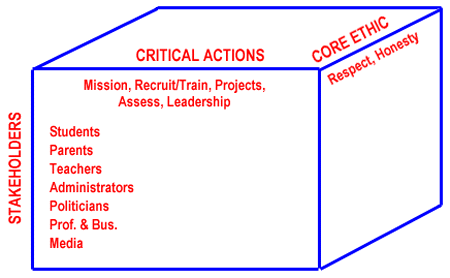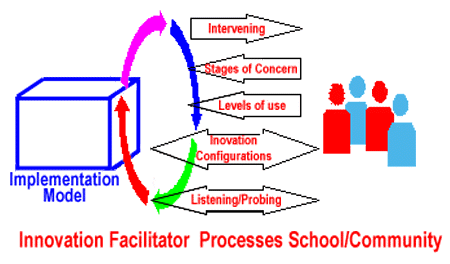SEE
A unique feature of SEE includes the availability of a strategic planning model to implement character education initiatives. This strategic planning model was developed during field evaluations of mature character education programs and is informed by years of evaluating Character.org's National Schools of Character with their 11 Principles of Effective Character Education. SEE can support this planning model with an implementation checklist which provides the opportunity to assess progress during the implementation of a character education plan. Workshops focused on this effort can be completed in 2 to 4 hours.
|
Implementing Successful Character Education
The public's documented concern for society's declining ethics and character is not sufficient to guarantee successful implementation of character education. Implementing character education will require the active support of school leadership. School leaders are understood to have their own concerns regarding character education which include-- the residual 1960s-70s fear of teaching values in schools, and pressure related to focusing everyone's time on academic content to improve standardized test scores. Anecdotal evidence notes well implemented character education programs have unified diverse communities around shared values and also improved school environments for the mastery of academic material1234. |
|
Successful implementation, however, requires more than just the efforts of school administrators. Support committees are recognized as invaluable in the start-up and maintenance of character education initiatives. A committee or team can take many forms, and be under the umbrella of a school site-management team or school improvement team, however, it must be self-sustaining to maintain meaningful progress. Successful committees leverage their outreach into the school by including school staff members from a variety of positions, students, parents, and members of the community.
|
Wise strategic planning will help focus a character education team on a few critical activities. A clearly written vision statement which highlights shared community values and encourages regular professional development can guide committee activities. A well-written vision statement will also help team members select character education program options for implementation. Classroom meeting strategies, moral discipline policies and procedures, democratic governance, cooperative learning, service learning and integrating values into the curriculum are examples of program concepts which advance comprehensive character education. Finally, the committee should be responsible for the ongoing assessment of all programs through a practical action-research design or with a traditional control and experimental treatment study.
While the process of implementing character education is not a mystery, one must recognize the need to attend to the strategic details with the support of a team approach to ensure success. Schools are busy places where new initiatives easily succumb to the demands of the urgent. Poorly defined character initiatives or poorly implemented programs will easily lead to a lose of teacher and public confidence in the school's mission to educate for character. Visionary leaders are needed with the courage and energy to move comprehensive character education forward with the support of a school-based team. The School for Ethical Education encourages those committed to excellence in character education to create a team and work together in their local schools to put Ethics in Action!
1 Vincent, P. F. (Ed.). (1996). Promising practices in character education. Chapel Hill:, NC: Character Development Group.
2 DeRoche, E. F. , & Williams, M. M. (1998). Educating hearts and minds: A comprehensive character education framework. Thousand Oaks, CA: Corwin Press, Inc.
3 Lickona, T., (1991). Educating for character. New York: Bantam Books.
4 Ryan, K. & Bohlin, K. E., (1999). Building character in schools: Practical ways to bring moral instruction to life. San Francisco: Jossey-Bass.
While the process of implementing character education is not a mystery, one must recognize the need to attend to the strategic details with the support of a team approach to ensure success. Schools are busy places where new initiatives easily succumb to the demands of the urgent. Poorly defined character initiatives or poorly implemented programs will easily lead to a lose of teacher and public confidence in the school's mission to educate for character. Visionary leaders are needed with the courage and energy to move comprehensive character education forward with the support of a school-based team. The School for Ethical Education encourages those committed to excellence in character education to create a team and work together in their local schools to put Ethics in Action!
1 Vincent, P. F. (Ed.). (1996). Promising practices in character education. Chapel Hill:, NC: Character Development Group.
2 DeRoche, E. F. , & Williams, M. M. (1998). Educating hearts and minds: A comprehensive character education framework. Thousand Oaks, CA: Corwin Press, Inc.
3 Lickona, T., (1991). Educating for character. New York: Bantam Books.
4 Ryan, K. & Bohlin, K. E., (1999). Building character in schools: Practical ways to bring moral instruction to life. San Francisco: Jossey-Bass.
Ethics in action creates character


